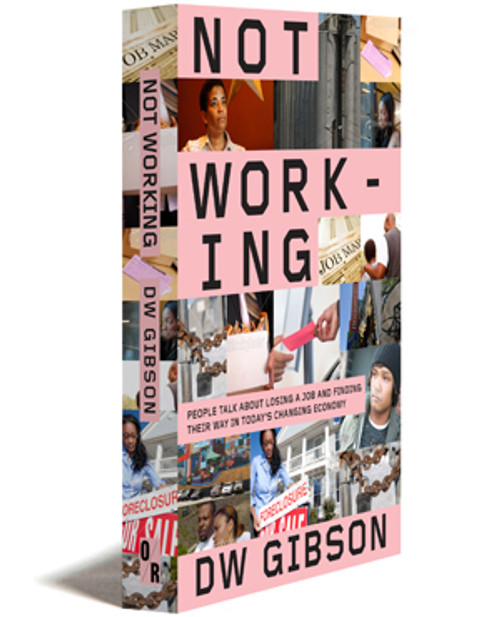Not Working
"This is a powerful and heart-wrenching story that is unfortunately replicated far too many times by far too many people."
- Ken Burns, documentary filmmaker"The book gives a name and a face to what is often tossed around as a mere statistic."
- New York ObserverAvailable exclusively in the USA and Canada from Penguin Books.
about the book
In the summer and early fall of 2011, the writer DW Gibson set off on a journey across the United States. His purpose: to interview Americans who have lost their jobs in the ongoing economic disaster that has destroyed the livelihood of millions. The result: a book that takes the pulse of the victims of today's financial crisis and delivers a prognosis combining an extraordinary mix of pathos, anger, solidarity and humor.
Together with two companions, a filmmaker and a playwright, Gibson travelled from the collapsing new economy white-box factories of California to the rusting and derelict industrial plants of the Northeast. Along the way, he talked to the recently unemployed of all stripes - a college graduate fired from her first job after just a week at work, an HR executive dismissed after herself laying off hundreds of her colleagues, a cleaner fired in a cafeteria during her lunch break, and a real estate executive whose first inkling that something was amiss occurred when he arrived at his office to find it abandoned.
Each of these stories is different, and the detail of how people experience the trauma of being "let go" provides a fascinating core to Not Working. But, beyond the specifics, important general themes emerge: the range of the recession which, despite the particular vulnerabilities of people of color and the less-educated, is impacting communities right across the country; the sense of isolation and purposeless that accompanies losing one's job and the widespread feeling that the victims are somehow responsible for their fate; and the inventiveness, generosity and good humor of many of those trying to rebuild lives shattered by lost income and self-respect.
Inspired by the great oral historian Studs Terkel, whose Working dominates the canon of American social history, Not Working is a book of burning importance for America today, a critical intervention in an election year when stubbornly immovable 9% unemployment is certain to be the central issue. In these pages we see unemployment not as a statistic but as a real tragedy in the lives of many Americans whose compelling stories demand to be heard.
Not Working, the book, will be accompanied by a documentary film of the same name.
Visit the website for Not Working
"Inspired by the great oral historian Studs Terkel's Working, Gibson's tome is a touching and all-too-necessary text for 2012. From the East Coast through the middle of our country, and on out West, Gibson, armed with a recorder, van, and tremendous pathos, recorded people whose stories contain both tragedy and humor, a stubborn will to survive despite their desperate circumstances." - Interview Magazine
"With grace and compassion, DW Gibson's Not Working brings us the stories of America’s disregarded. Through the book's many voices, we get a detailed and harrowing, but utterly unsentimental,sense of the lives of others. An intense, moving, ground-level history of our difficult times." - Teju Cole, author, Open City
"I think that's what really affected me, thinking maybe you're looking too much at the numbers and the metrics and the Excel spreadsheet and forgetting the fact that that little number you see on column A, row seven is an actual person with a wife, with a kid, with a car payment, with a mortgage, and is actually from your country, from your neighborhood, and is a viable person in the community." - Erik Hill, salesman, Tacoma, Washington
About The Author / Editor
in the media
Not Working
"This is a powerful and heart-wrenching story that is unfortunately replicated far too many times by far too many people."
- Ken Burns, documentary filmmaker"The book gives a name and a face to what is often tossed around as a mere statistic."
- New York ObserverAvailable exclusively in the USA and Canada from Penguin Books.
about the book
In the summer and early fall of 2011, the writer DW Gibson set off on a journey across the United States. His purpose: to interview Americans who have lost their jobs in the ongoing economic disaster that has destroyed the livelihood of millions. The result: a book that takes the pulse of the victims of today's financial crisis and delivers a prognosis combining an extraordinary mix of pathos, anger, solidarity and humor.
Together with two companions, a filmmaker and a playwright, Gibson travelled from the collapsing new economy white-box factories of California to the rusting and derelict industrial plants of the Northeast. Along the way, he talked to the recently unemployed of all stripes - a college graduate fired from her first job after just a week at work, an HR executive dismissed after herself laying off hundreds of her colleagues, a cleaner fired in a cafeteria during her lunch break, and a real estate executive whose first inkling that something was amiss occurred when he arrived at his office to find it abandoned.
Each of these stories is different, and the detail of how people experience the trauma of being "let go" provides a fascinating core to Not Working. But, beyond the specifics, important general themes emerge: the range of the recession which, despite the particular vulnerabilities of people of color and the less-educated, is impacting communities right across the country; the sense of isolation and purposeless that accompanies losing one's job and the widespread feeling that the victims are somehow responsible for their fate; and the inventiveness, generosity and good humor of many of those trying to rebuild lives shattered by lost income and self-respect.
Inspired by the great oral historian Studs Terkel, whose Working dominates the canon of American social history, Not Working is a book of burning importance for America today, a critical intervention in an election year when stubbornly immovable 9% unemployment is certain to be the central issue. In these pages we see unemployment not as a statistic but as a real tragedy in the lives of many Americans whose compelling stories demand to be heard.
Not Working, the book, will be accompanied by a documentary film of the same name.
Visit the website for Not Working
"Inspired by the great oral historian Studs Terkel's Working, Gibson's tome is a touching and all-too-necessary text for 2012. From the East Coast through the middle of our country, and on out West, Gibson, armed with a recorder, van, and tremendous pathos, recorded people whose stories contain both tragedy and humor, a stubborn will to survive despite their desperate circumstances." - Interview Magazine
"With grace and compassion, DW Gibson's Not Working brings us the stories of America’s disregarded. Through the book's many voices, we get a detailed and harrowing, but utterly unsentimental,sense of the lives of others. An intense, moving, ground-level history of our difficult times." - Teju Cole, author, Open City
"I think that's what really affected me, thinking maybe you're looking too much at the numbers and the metrics and the Excel spreadsheet and forgetting the fact that that little number you see on column A, row seven is an actual person with a wife, with a kid, with a car payment, with a mortgage, and is actually from your country, from your neighborhood, and is a viable person in the community." - Erik Hill, salesman, Tacoma, Washington
About The Author / Editor







